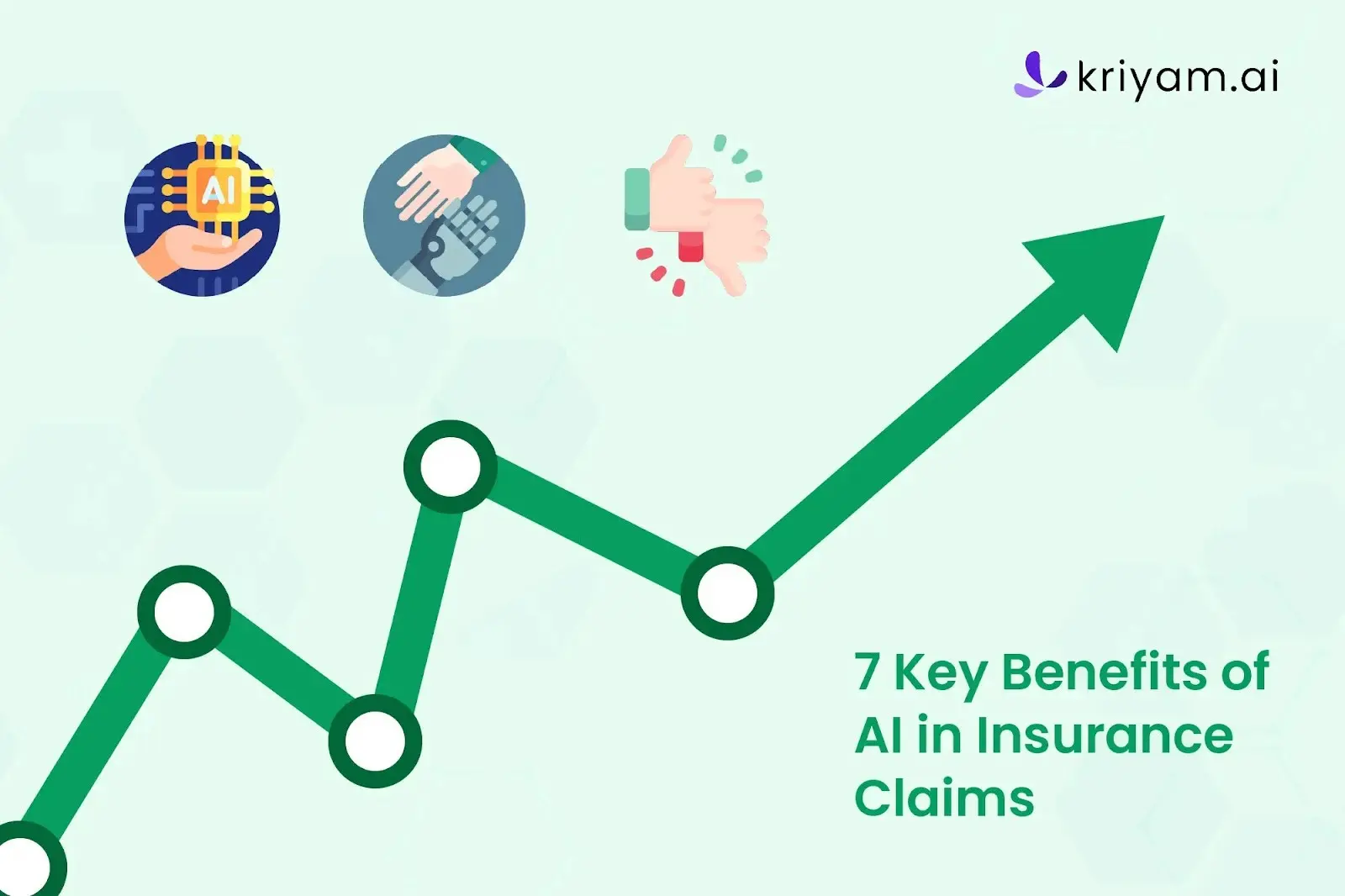AI in Insurance Claims: 7 Key Transformative Impacts
Suvajit Sengupta | 18th January, 2024
5 min reads
Suvajit Sengupta | 18th January, 2024 | 5 min reads

Trying to improve the insurance claim processing? Are you curious how AI integration transforms the traditionally labor-intensive insurance claims process? You are at the right place!
In this blog, we'll explore the transformative benefits of AI in insurance claims.
The advantages are vast and significant, from heightened accuracy to enhanced customer experiences. Join us as we delve into the '7 Benefits of AI-Driven Insurance Claims Management', a game-changer for insurers and policyholders.
Ready to take a peek into the future of insurance? Let's get started!
7 Key Benefits of AI in Insurance Claims: Enhancing Insurance Claim Processing
 Let's get into the 7 key benefits, from speeding up claim processing to enhancing accuracy. Each benefit demonstrates how AI makes insurance claims more efficient and customer-friendly.
Let's get into the 7 key benefits, from speeding up claim processing to enhancing accuracy. Each benefit demonstrates how AI makes insurance claims more efficient and customer-friendly.
By integrating AI technologies, insurance companies are enhancing not just the efficiency of claim processing but also elevating the quality of customer service, bolstering accuracy, fortifying data security, acquiring deeper customer insights, realising significant cost savings, and smoothing out daily operations.
Here's an in-depth exploration of the seven key benefits of AI in insurance,
1. Accelerated Claim Processing
AI in insurance, particularly in AI claims processing, has revolutionised the industry. This advanced approach transforms how claims are handled by making the process faster and more accurate.
By automating routine tasks such as data entry and document verification, AI claims processing ensures quick and accurate data integration into the system. This means that information in claim documents is swiftly and precisely recorded.
Furthermore, AI checks these documents against existing data to verify their validity, enhancing the accuracy of the process. A significant shift is also evident in how AI assists in determining the validity of a claim.
It examines the details of each claim, aligns them with the policy terms, and references past data to make quick and correct decisions. This reduces errors and expedites the claim resolution process.
With time, it becomes increasingly adept at managing claims, identifying fraudulent activities, and predicting potential issues before they arise.
This ongoing enhancement leads to greater system efficiency. Implementing AI in claims processing reduces the need for manual involvement in routine tasks, freeing up personnel to tackle more complex issues.
Read more about top AI-driven software solutions that can enhance claims processing efficiency
2. Better Customer Service
In the world of insurance, AI is making a significant impact on customer service. The integration of AI in the insurance industry has notably revolutionised customer service, creating a more responsive and accessible support system.
By integrating AI-powered chatbots and virtual assistants, insurance companies can offer 24/7 support to their customers.
This means whenever a customer has a question about their policy, needs guidance on filing a claim, or seeks any insurance-related information, these AI tools are readily available to provide immediate assistance.
The real game-changer here is the level of responsiveness and efficiency that AI brings to customer interactions.
Unlike traditional customer service channels, which may have limited hours and often involve waiting times, AI systems respond instantly.
This speed and availability significantly enhance the customer experience. Customers no longer need to adjust their schedules to contact customer service during business hours or wait in long phone queues to get their queries addressed.
As per a study by Forrester, 63% of customers are more likely to return to a company that offers excellent customer service.
This statistic underscores the importance of quality customer interactions in building customer loyalty and satisfaction.
With AI, insurance companies can meet and exceed customer expectations, which can lead to higher customer retention rates.
3. Increases Accuracy in Claims Processing
In insurance claim processing, AI and machine learning are pivotal in enhancing the accuracy and efficiency of claims processing.
Here's how this works straightforwardly:
Machine learning algorithms, a core component of AI systems, dive into the vast sea of historical data related to insurance claims.
They are not just passively reviewing this data but actively learning from it. These algorithms look for patterns, trends, and any anomalies in the data.
For instance, they can detect unusual claim patterns that might indicate errors or potential fraudulent activity.
This capability to learn and detect patterns is particularly valuable in reducing errors. Traditionally, insurance claims processing involved a lot of manual effort, which naturally led to a higher likelihood of human error.
With AI, the system can identify and correct these errors, ensuring that the claims are processed in compliance with established standards and regulations.
Moreover, AI's predictive capabilities come into play. By analysing past data, AI can predict common issues that might arise in claims processing and take proactive steps to avoid them.
This predictive aspect is crucial for maintaining a high standard of accuracy. This AI-driven process results in a more reliable and efficient claims processing system.
Claims are handled accurately, reducing the chances of incorrect claim adjudications. For the customer, this means their claims are processed correctly and swiftly.
For the insurance company, it increases efficiency, reduces costs related to correcting errors, and enhances customer trust.
4. Increased Data Security
In the insurance sector, AI significantly strengthens data security, a critical aspect considering the sensitive nature of the information involved.
AI systems enhance data privacy and security in a seamless and integrated manner. Firstly, AI applies advanced encryption methods to protect data. This means sensitive customer information and financial records are encoded, making it difficult for unauthorised individuals to decipher. This encryption acts as a robust barrier against potential data breaches.
Alongside encryption, AI establishes strict access controls. These controls are like virtual gatekeepers, ensuring only authorised personnel can access specific data types. This helps prevent unauthorised viewing or stealing of data and reduces the risk of internal breaches.
Furthermore, AI systems ensure compliance with various data protection laws and regulations. They can adapt and respond to the ever-evolving landscape of data privacy regulations, helping insurance companies stay compliant and avoid legal repercussions.
One of the most significant contributions of AI in data security is its ability to detect and respond to unusual activities that may signal a data breach.
For instance, if there's an unexpected attempt to access a large volume of data, AI systems can quickly flag this as suspicious and initiate protective measures.
5. Improved Customer Insights
The advent of AI in insurance process automation is fundamentally changing how insurance companies comprehend and engage with their customers, primarily through enhanced customer insights.
What happens is AI systems analyse past claims data, examining patterns and trends. This is more than just looking at the claims made and understanding their context.
For instance, AI can detect if there's a surge in certain types of claims during specific times of the year or in particular regions. It can also pinpoint common issues customers face or preferences they exhibit in their insurance choices and interactions.
This analysis is crucial as it paints a clearer picture of customer behaviour, preferences, and needs. It goes beyond the surface, providing insights that take time to be noticeable.
For example, AI might find that customers in a particular age group prefer digital communication over phone calls or that there's a high demand for a particular type of insurance coverage in a specific area.
The end goal here is to create a more customer-centric approach. By understanding the customers better, insurance companies can enhance their services, making them more relevant and appealing.
This not only improves customer satisfaction but can also give companies a competitive edge in the market.
6. Cost Savings
Cost savings in the insurance industry, driven by AI automation, are significant and varied.
When AI is used to automate various tasks, it streamlines processes and cuts down on expenses in several key areas.
One of the most striking examples of cost savings through AI is in payment processing. The automation of this area alone can lead to substantial financial benefits.
According to the National Association of Insurance Commissioners (NAIC), automating payment processing can reduce costs by up to 30%.
This reduction is primarily due to the decreased need for manual handling and processing of payments, which can be both time-consuming and prone to errors.
Furthermore, data entry, a task traditionally requiring significant human resources, is another area where AI brings about cost efficiency. The implications of this are profound, not just in terms of reducing the labour hours required for data entry tasks but also in minimising errors that can lead to costly rectifications.
Additionally, accounting costs, which encompass various financial management aspects of an insurance company, have also dramatically reduced thanks to AI.
Nanonets indicate an 80% saving in these costs. This level of cost-efficiency can lead to a 3-5 times return on investment (ROI) payback over just three months. This quick return on investment shows how much AI automation can improve an insurance company's profits.
7. Streamlined Day-to-Day Operations
AI is significantly streamlining day-to-day operations in the insurance industry, considerably impacting how routine tasks are managed.
This technology simplifies and improves the efficiency of various operational aspects. One key area where AI is making strides is in document processing.
In the insurance sector, handling numerous documents is an everyday task. AI helps automate this process, swiftly sorting and organizing large volumes of data in these documents.
This speeds up the processing time and reduces the likelihood of human errors. Compliance checks are another crucial operational aspect that benefits from AI. The insurance industry is heavily regulated, and ensuring compliance is a constant challenge.
AI systems are equipped to automatically check and ensure that processes and documents adhere to the required legal standards and regulations. This automation significantly reduces the manual workload and the risk of non-compliance, which can be costly for insurance companies.
By incorporating AI into these processes, the overall operational efficiency is significantly boosted.
Tasks that used to take hours or days can now be completed in a much shorter time frame.
This efficiency is not just about speed; it also means that employees are freed from repetitive and mundane tasks. As a result, they can focus on more strategic and value-added activities, such as customer service and product development.
Integrating AI in insurance claim processing is not just a trend but a paradigm shift towards more efficient, secure, and customer-centric operations. With continuous advancements in AI technology, the potential for further improvements and innovations in this field remains vast.
How is AI already used in Insurance claim processing?
 Artificial Intelligence (AI) is already making significant inroads in insurance claim processing.
Artificial Intelligence (AI) is already making significant inroads in insurance claim processing.
Its usage spans various aspects, making the process more efficient, accurate, and customer-friendly. Here's a detailed look at how AI is being utilised in insurance claim processing:
Automated Data Processing and Entry: AI systems excel in managing the vast volumes of data in insurance claims. They streamline data entry by extracting details from claim forms and related documents, expediting the process and minimising human error risks. For example, scanning and interpreting data from a car accident report to quickly input claim details.
Enhanced Fraud Detection: An essential application of AI in insurance claim processing is detecting fraud. AI algorithms scrutinise patterns and inconsistencies in claims data that may suggest fraud. They can comb through large datasets to pinpoint dubious claims, protecting companies from potential fraud-related losses.
An example is identifying unusual patterns in claims submissions from a particular region that could indicate organised fraud.
For more insights into AI's impact on the insurance industry, read about key AI use cases in the industry.
Claim Processing and Decision Making: AI facilitates claim processing by automating decision-making processes. It evaluates claims against policy terms and historical data, ensuring accurate and equitable processing based on established criteria and regulations. For instance, AI might automatically approve or flag claims based on predefined parameters, like claim value or incident type.
Customer Service and Support: AI-driven chatbots and virtual assistants are increasingly common in the insurance sector. They address customer inquiries about claims, assist in submission, and provide status updates, enhancing customer experience and lightening human representatives' workload.
An example is a chatbot that helps customers navigate the claim submission process and answers frequently asked questions.
Predictive Analytics for Risk Assessment: AI employs predictive analytics for claim risk evaluation. By analysing past data, it anticipates future trends and identifies potential high-risk claims and concerns. This ability allows insurers to manage risks better and allocate resources.
For instance, predicting the likelihood of claims in a particular area based on historical accident data.
Streamlining Claims Workflow: AI refines the claims workflow by unifying various tasks efficiently. From the initial registration to the final settlement, AI ensures streamlined management of each step in the claims process, boosting overall operational efficiency. An example is the automated routing of claims to appropriate departments for processing.
AI in insurance claim processing, an essential aspect of automation in insurance claims, is both a vision of the future and a current reality.
Its roles range from automating mundane tasks to advanced fraud detection and predictive analysis, all aimed at rendering the claim process quicker, more precise, and user-friendly. As AI technology evolves, its significance in insurance claim processing is poised to grow more essential and transformative.
Kriyam.ai: Where AI meets insurance for faster, accurate claims!
Kriyam.ai specialises in leveraging AI technology to revolutionise insurance claims management.
Their platform uses advanced algorithms to automate and streamline the claims process, significantly reducing the time and effort of handling claims.
By analysing vast data, Kriyam.ai can efficiently detect fraud, assess damages, and predict risks, leading to more accurate and fair claim resolutions.
This not only improves the efficiency of insurance companies but also enhances customer satisfaction by providing quicker, more reliable claim settlements.
Key features
- Automated Claims Processing
- Fraud Detection and Prevention
- Damage Assessment and Risk Prediction
- Enhanced Customer Experience

Conclusion
Forget slow claim processing and endless paperwork – AI is turbocharging insurance to supersonic speed! It's not just an upgrade; it's a revolution, redefining the entire claims experience.
AI delivers:
Lightning-fast claim processing: AI automates the drudgery, freeing adjusters for complex cases and personalized care.
Eagle-eyed fraud detection: Sharp AI algorithms identify inconsistencies faster than a bloodhound on a scent, protecting you from phony claims.
24/7 customer support: Friendly AI chatbots are always on standby, providing instant answers and support with a digital smile.
But the magic doesn't stop there. AI's crystal ball lets it predict the future, allowing insurers to tailor policies and anticipate risks with laser precision. This means:
Fairer rates: No more paying for someone else's misfortune.
Smarter resource allocation: Your money goes where it matters most.
A more secure financial future: Everyone wins.
So, buckle up! The AI-powered insurance landscape is smoother, faster, and more satisfying than ever.
Ready to experience the difference? Dive into Kriyam.ai's wave of AI innovation and see how your insurance experience can transform from sluggish to supersonic!
Don't wait! Experience the future of insurance today.
About the author
Suvajit Sengupta
Co-founder & CTO
Suvajit Sengupta | Co-founder & CTO
A passionate technologist who thrives at the intersection of customer needs and innovation. With a track record of building adaptive product teams, he share insights on solving real-world problems with AI and scalable tech solutions.
Interests: AI products, Team Leadership, Data Strategy
Content Overview
Share
FEATURED
Automation
Top 5 Best Field Service Management Software in 2025
Best Field Service Management Software
Shreyas R
27th November, 2023



